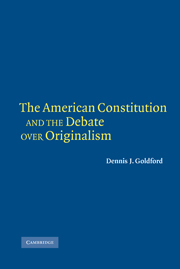Book contents
- Frontmatter
- Contents
- Preface
- Introduction
- 1 The Politics of Originalism
- 2 The Concept of a Living Constitution
- 3 Interpretivism and Originalism
- 4 The Paradox of Originalism
- 5 The Problem of Objectivity
- 6 The Epistemology of Constitutional Discourse (I)
- 7 The Epistemology of Constitutional Discourse (II)
- 8 The Ontology of Constitutional Discourse (I)
- 9 The Ontology of Constitutional Discourse (II)
- 10 Conclusion: The Political Character of Constitutional Discourse
- Index
1 - The Politics of Originalism
Published online by Cambridge University Press: 14 May 2010
- Frontmatter
- Contents
- Preface
- Introduction
- 1 The Politics of Originalism
- 2 The Concept of a Living Constitution
- 3 Interpretivism and Originalism
- 4 The Paradox of Originalism
- 5 The Problem of Objectivity
- 6 The Epistemology of Constitutional Discourse (I)
- 7 The Epistemology of Constitutional Discourse (II)
- 8 The Ontology of Constitutional Discourse (I)
- 9 The Ontology of Constitutional Discourse (II)
- 10 Conclusion: The Political Character of Constitutional Discourse
- Index
Summary
Beyond the primary issues of foreign policy and the economy, the main preoccupation of American politics for approximately the past forty years has been an intense struggle over the social phenomena we have come to know generally under the rubric of “the sixties.” Considered culturally rather than chronologically – that is, as the sixties rather than as the 1960s – this period began with the civil rights movement, the rise of the New Left, and the Kennedy assassination in the early 1960s, continued with the evanescent counterculture of hippies and flower children in San Francisco and elsewhere from the mid-1960s until 1970, and ended with Richard Nixon's second inauguration and the cessation of the military draft in January 1973. We recall various slogans from this period, such as “Make love, not war” or “Tune in, turn on, drop out,” but perhaps the most general and fundamental slogan, the one that, though less familiar, captured the ethos of the sixties, was this: “There will be respect for authority when authority is respectable.” The defining theme of the sixties, at bottom, was the questioning of authority. Post-sixties cultural politics in America has been marked by a reassertion of traditional authority.
Specifically, over the years since the sixties, we have witnessed the political ascendancy of a conservative counterrevolution against the liberalization the sixties wrought in various areas of American life, resulting in an ongoing conflict between a peculiarly American cultural reformation and counterreformation, sixties versus traditional culture.
- Type
- Chapter
- Information
- Publisher: Cambridge University PressPrint publication year: 2005

